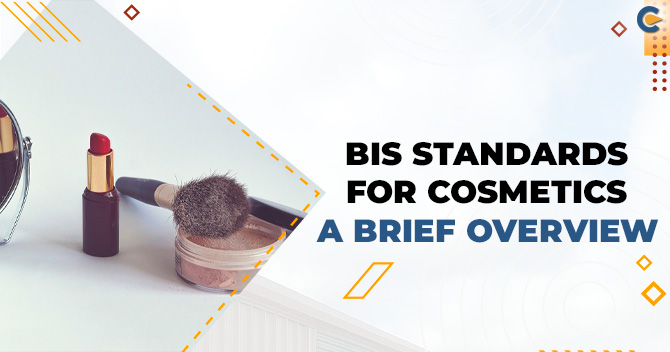The cosmetics market in India still lacks comprehensive fencing from the regulatory authorities. Presently, it is witnessing an annual growth rate (aka AGR) of 20%. This growth is two folds when contrasted with European and American markets. The Central Drugs Standard Control Organization administers the safety and quality of the cosmetics items, broadly recognized as CDSCO. This write-up intends to pens down certain critical information related to the BIS standards for cosmetics.
A General Overview on the BIS standards for cosmetics
In the purview of the Drugs & Cosmetics Act 1940 & Rules 1945, Cosmetic refers to items aimed to be rubbed, sprinkled, poured, or introduced into, or sprayed onto the human body or any part thereof for beautifying, cleansing, enhancing looks, or modifying the appearance, & consist of any article aimed for use as a component of cosmetic.
In India, Cosmetics items are regulated under the purview of the Drugs & Cosmetic Act 1940 & Rules 1945 & labelling declaration by BIS (aka Bureau of Indian Standards). BIS underpins the norms for cosmetics for the items cited under the Schedule S of the Drugs & Cosmetics Rules 1945.
The cosmetics items that comes under the ambit of Schedule S of the BIS standards for cosmetics:
- Skin Powders
- Tooth Powder
- Skin Powder for infants
- Skin Creams
- Toothpaste
- Hair Oils
- Shampoo, Synthetic-Detergent based
- Shampoo, Soap-based
- Hair Creams
- Cologne
- Oxidation hair dyes, Liquid
- After Shave Lotion
- Nail Polish (Nail Enamel)
- Pomades and Brilliantines
- Shaving Creams
- Depliatories chemicals
- Cosmetic Pencils
- Toilet Soap
- Lipstick
- Liquid Toilet Soap
- Shaving Soap
- Baby Toilet Soap
- Transparent Toilet Soap
- Powder Hair Dye IS 10350 26
- Bindi (Liquid) IS: 10998
- Lipsalve IS:10284
- Henna Powder IS: 11142
- Kum Kum Powder IS: 10999 28
All the aforementioned cosmetics items should stay in line with the updated BIS’s norms. Bureau of Indian Standard has facilitated certain specifications for lipstick & skin creams in the Indian Standards (IS) 9875:1990 & 6608:2004.
BIS standards for cosmetics: Presence of heavy metals
As per the Indian Standard 6608:2004, there is no need to test the finished cosmetic good for heavy metals & arsenic if it has been tested in the pre-production stage.
There should be a declaration for Hexachlorophene & heavy metal for the registration of cosmetics items.
The test report including the result of heavy metals, including arsenic, lead, mercury and if the microbiological test. Undertaking from the cosmetic manufacturers declaring compliance of all pigments/raw material used, Hexachlorophene contents, & heavy metals (with prescribed limits) in items with BIS & Drugs and Cosmetic Rules, 1945.
Standards related to the Colouring Agent present in Cosmetics
If the dyes colour presented in the skincare products & lipstick, then such products must comply with Indian Standard IS 4707 (Part I). It should be in accordance with the Schedule Q of Drugs and Cosmetics Act and Rules laid down by CDCSO[1] & as amended from time to time. The rest of the ingredients in such items must comply with the norms of IS 4707 (Part 2).
Rule 134 of Drugs and Cosmetics Rules impose a prohibition on the use of cosmetic items containing colours, dyes, & pigments other than those cited by the BIS (IS 4707 Part 1 as amended) as well as Schedule Q.
In the purview of Rule 145 of the Drugs and Cosmetics Rules, the use of heavy metals, including lead & arsenic compounds in cosmetics items for colouring, is not permissible. The importation of cosmetic items that contain lead or arsenic compounds for colouring purposes is banned under Rule 135.
The manufacturing, as well as the import of Cosmetic items containing mercury compounds, are prohibited under Rule 145 D and 135 A.
How to get registered under BIS?
To avail of BIS certification, the businesses dealing with cosmetic manufacturing must have the required infrastructure in place and the prescribed process control and testing capabilities for the products as per the Indian Standard. The cosmetic items shall also stay in line with norms underpinned in the ISS.
BIS underpins the norms for the cosmetic items which come under Schedule S of the Drugs & Cosmetic Rules, 1945. Items under Schedule S shall adhere to the Indian Standards norms incorporated from time to time by BIS, including toothpaste, Heena powder, skin powders, and so on.
What are the BIS norms for the use of Dyes and Pigments in cosmetics?
For skin creams & lipstick, if dyes colour is used, they shall stay in line with IS 4707 (Part I). The other ingredients should be used in the purview of the provisions of IS 4707 (Part 2).
What is the service tenure of a BIS certification?
BIS registration under Scheme-I serves a validity period of two years. The validity period would remain in effect only for items listed in the license. To extend the license validity, the applicant needs to fill a prescribed application form, and a standard fee and documents under the prevailing license must be submitted. License tenure may be stretched up to 5 years from the last date of validity of the license.
Maximum Authorized Concentration of Chemical in Finished Cosmetic Products (As per IS 4707-2 (2009)
| Substances | Field of Application | Max permissible limit in Cosmetic products |
| Boric Acid | Talc | 5% by mass/mass |
| Tetraborate | Bath products | 18% by mass/mass |
| Thioillycollic acid and its salts | Hair waving | 8% r |
| Oxalic acid, its esters & alkaline salt | Hair care products | 5% |
| Chlorates of alkali metals | Tooth paste | 5% |
| Formaldehyde | Nail hardners | 5% estimated as formaldehyde |
| Hydroquinone | Oxidizing color agent for hair dyeing | 0.3% |
This is not an exhaustive list, so feel free to refer the concerned standard for more information.
Conclusion
In the purview of the health and safety of the general masses, the BIS have underpinned a long list of the norms that compels the cosmetic industry to use the aforementioned ingredients in the permissible limit. BIS standards for cosmetics are quite exhaustive and cover hundreds of critical substances that are prominently used in the cosmetics items.
Read our article:BIS Certification for Footwear Manufacturers: How to obtain it?













